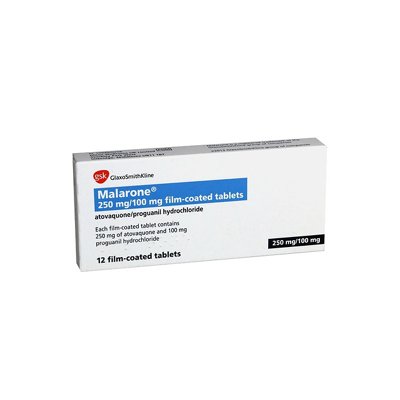Malarone tablets
Malarone is a trusted medication for the prevention of malaria, recommended for areas of high risk. It has one of the shortest treatment durations making it very convenient, even starting just a few days before travel.
- Short course
- Taken 1-2 days before till 7 days after travel
- Once daily dosing
- Few side-effects
What is Malarone?
Malarone is a branded treatment and one of the most convenient drugs available to prevent malaria when traveling to high risk areas. It contains the active ingredients Atovaquone and Proguanil.
Treatment with Malarone needs to be started 1-2 days before travel and should be taken for 7 days after leaving the high risk area.
It should be used in conjunction with measures to avoid mosquito bites in order to prevent malaria.
Please check the Destinations - Fit for Travel website to make for risk of malaria for the area you are travelling to including information on other necessary vaccinations.
Malarone is a branded treatment and one of the most convenient drugs available to prevent malaria when traveling to high risk areas. It contains the active ingredients Atovaquone and Proguanil.
Treatment with Malarone needs to be started 1-2 days before travel and should be taken for 7 days after leaving the high risk area.
It should be used in conjunction with measures to avoid mosquito bites in order to prevent malaria.
Please check the Destinations - Fit for Travel website to make for risk of malaria for the area you are travelling to including information on other necessary vaccinations.
Malarone is taken once daily starting 2 days before travel and for 7 days after leaving the high risk areas.
Your prescriber will recommend the dose to take which is usually 1 tablet daily for an adult.
Your prescriber will recommend the dose to take which is usually 1 tablet daily for an adult.
Malarone should not be taken if
Effectiveness can be reduced by severe vomiting.
Malarone is recommended for the prevention of malaria only.
Malarone should not be used when pregnant or breastfeeding
Malarone may cause dizziness or drowsiness. If affected do not drive or operate machinery.
- You are allergic to any of the listed ingredients
- If you have severe renal impairment.
- Your body weight is less than 40kg (speak to your prescriber for an alternative)
Effectiveness can be reduced by severe vomiting.
Malarone is recommended for the prevention of malaria only.
Malarone should not be used when pregnant or breastfeeding
Malarone may cause dizziness or drowsiness. If affected do not drive or operate machinery.
Very common side effects (more than 1-in-10 people):
Common side effects (1-in-10 to 1-in-100 people):
For information on other less common side-effects, please refer to the patient information leaflet.
- headache
- feeling sick and being sick
- stomach pain
- diarrhoea.
Common side effects (1-in-10 to 1-in-100 people):
- dizziness
- sleeping problems (insomnia)
- strange dreams
- depression
- loss of appetite
- fever
- rash which may be itchy
- coughs
For information on other less common side-effects, please refer to the patient information leaflet.
Speak to your prescriber if you are taking:
- Treatments for tuberculosis
- Metoclopramide
- Efavirenze
- Warfarin or other anticoagulants
- Certain antibiotics
The active ingredients are: 250 mg of atovaquone and 100 mg of proguanil hydrochloride in each tablet.
The other ingredients are: tablet core: poloxamer 188, microcrystalline cellulose, hydroxypropyl cellulose, povidone K30, sodium starch glycollate (Type A), magnesium stearate tablet coating: hypromellose, titanium dioxide (E171), iron oxide red (E172), macrogol 400 and polyethylene glycol 8000.
The other ingredients are: tablet core: poloxamer 188, microcrystalline cellulose, hydroxypropyl cellulose, povidone K30, sodium starch glycollate (Type A), magnesium stearate tablet coating: hypromellose, titanium dioxide (E171), iron oxide red (E172), macrogol 400 and polyethylene glycol 8000.
Alternatives include:
- Atovoquone and Proguanil (Generic)
- Doxycycline
- Preventing mosquito bites by using repellents containing DEET, wearing long sleeve clothing and using insect nets.



